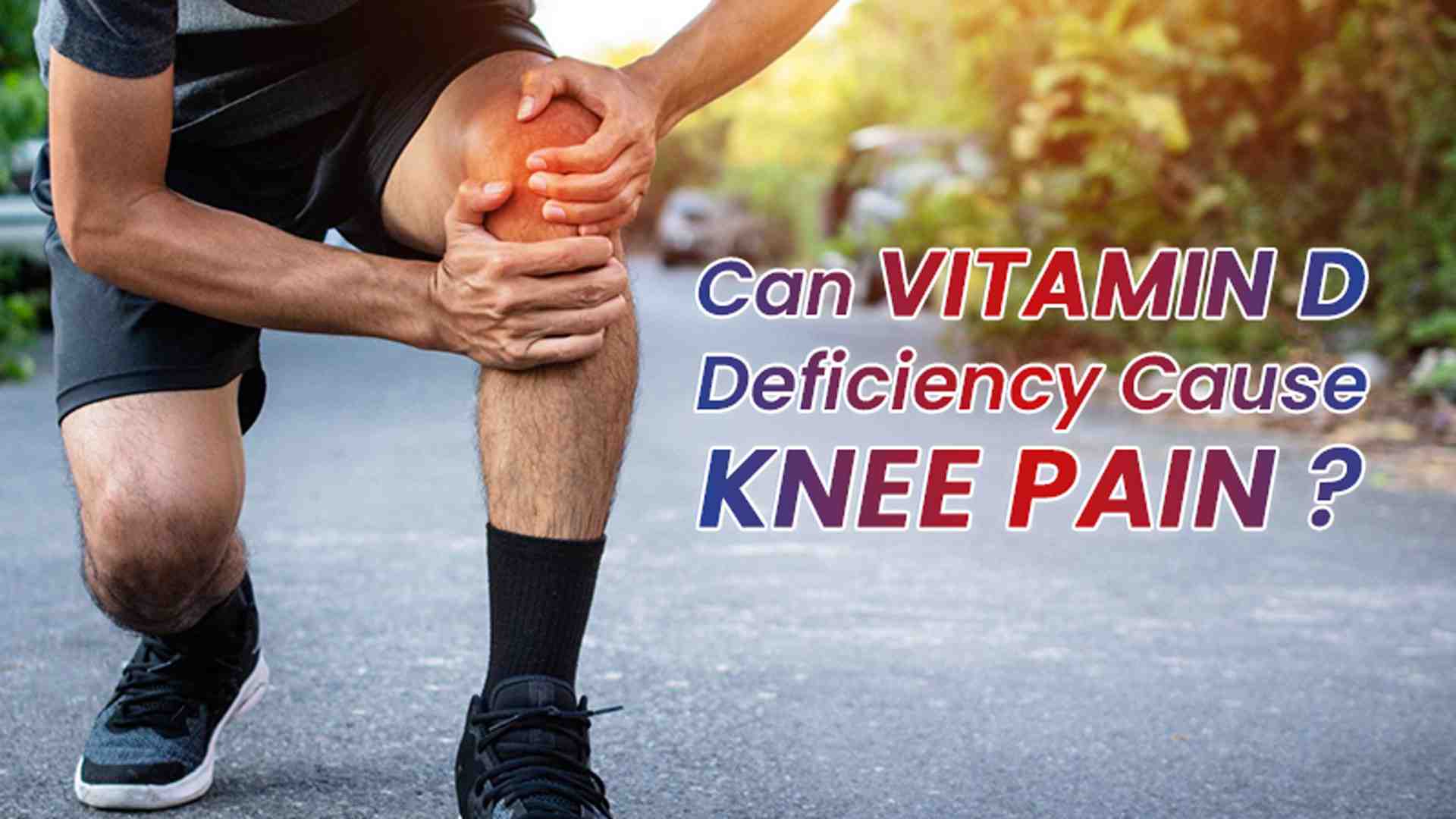Can Vitamin D Deficiency Cause Knee Pain?
Verified By Dr. Sushil Kumar | 16-Nov-2024
Knee pain is a common complaint affecting people of all ages, from active individuals to older adults. While knee pain often stems from injuries, arthritis, or overuse, an underlying and lesser-known cause could be vitamin D deficiency. Research has increasingly shown a connection between knee joint pain and vitamin deficiency, especially when it involves vitamin D, a vital nutrient for bone and joint health.
According to Dr. Sushil Kumar, Consultant Orthopedics at Kailash Hospital, Dehradun, “Vitamin D deficiency can lead to weakened bones and joint pain, including in the knees. Identifying and addressing this deficiency can significantly improve symptoms.
In this article, we’ll explore how vitamin D deficiency contributes to knee pain, how to recognize the symptoms, and what steps you can take to restore optimal joint health.
Table of Content
Vitamin D, commonly known as the "sunshine vitamin," is mainly produced by the skin when it is exposed to sunlight. It plays a vital role in calcium absorption, bone mineralization, and immune function.
Dr. Sushil Kumar, Consultant Orthopedics at Kailash Hospital, Dehradun, explains, "Vitamin D deficiency can lead to a decrease in bone mineral density, making bones more susceptible to fractures and pain. It can also contribute to inflammation in the joints, including the knees."
While low vitamin D levels often manifest as fatigue and muscle weakness, it can also lead to joint pain, including knee pain. Additional symptoms of vitamin D deficiency include:
- Chronic fatigue or low energy levels
- Muscle weakness or cramps
- Pain in other joints or bones
- Frequent illnesses or infections
- Slow healing of wounds or fractures
- Mood changes, including depression
Also read: Walking After Robotic Knee Replacement: How Soon Can You Get Back on Your Feet?
- Weakened Bone Strength: Vitamin D deficiency reduces calcium absorption, weakening the bones over time. This can lead to conditions like osteoporosis, which increases the risk of fractures and causes joint pain due to vitamin D deficiency.
- Inflammation in the Joints: Vitamin D has anti-inflammatory properties. A deficiency can exacerbate inflammation in the knee joints, leading to pain and stiffness.
- Muscle Weakness: Vitamin D deficiency also weakens the muscles surrounding the knee joint, increasing the stress on the joint and contributing to knee pain and vitamin deficiency.
- Osteoarthritis Risk: Long-term vitamin D deficiency may accelerate cartilage breakdown, a hallmark of osteoarthritis.
Dr. Kumar states, "Patients experiencing ongoing knee pain, particularly those who do not respond to standard treatments, should be assessed for vitamin D deficiency."
Certain groups of people are more prone to vitamin D deficiency and, consequently, joint pain. These include:
- Older adults
- Individuals with limited sun exposure
- Individuals with darker skin tones may have reduced vitamin D production due to higher melanin levels
- People who have malabsorption problems, like celiac disease or Crohn's disease.
- Overweight or obese individuals
- Pregnant or breastfeeding women
Also read: Knee Replacement Surgery: Expert Answers to Common Questions
At Kailash Hospital, Dehradun, diagnosing vitamin D deficiency involves a simple blood test to measure the level of 25-hydroxyvitamin D. Dr. Sushil Kumar stresses the importance of consulting a healthcare professional before self-diagnosing or starting supplementation.
“A comprehensive assessment is crucial,” he states. “We must determine if the knee pain is exclusively a result of vitamin D deficiency or if other issues, like arthritis, are also playing a role.”
- Vitamin D Supplementation: The primary treatment for knee pain vitamin deficiency is vitamin D supplementation. Depending on the severity of the deficiency, your doctor may recommend either daily doses or high-dose vitamin D taken weekly.
- Dietary Changes: Incorporating vitamin D-rich foods into your diet can help restore levels naturally. These include:
- Fatty fish (salmon, mackerel, sardines)
- Egg yolks
- Fortified dairy products and cereals
- Cod liver oil
- Sunlight Exposure: Sunlight is a natural source of vitamin D. Spending 10-30 minutes in the sun several times a week can boost vitamin D production in the skin. “Moderate sun exposure can be highly beneficial, but it’s essential to avoid overexposure to reduce the risk of skin damage,” advises Dr. Kumar.
- Physical Therapy and Exercises: For patients with muscle weakness and joint stiffness, physical therapy can improve strength and mobility. Building strength in the muscles surrounding the knee can help reduce stress on the joint.
- Pain Management: Over-the-counter pain relievers, anti-inflammatory medications, or topical gels may provide temporary relief while addressing the root cause.
Also read: Robotic Knee Replacement: The Next Generation in Knee Surgery
Preventive measures can go a long way in avoiding knee pain and vitamin deficiency. Dr. Kumar recommends the following strategies:
- Regular Health Checkups: Monitor your vitamin D levels, especially if you are at risk.
- Balanced Diet: Include vitamin D and calcium-rich foods in your meals.
- Weight Management: Keep a healthy weight to lessen the strain on your knees.
- Exercise Regularly: Engage in weight-bearing exercises like walking or yoga to keep bones and joints strong.
- Sunlight Exposure: Incorporate outdoor activities into your routine to get natural vitamin D.
Persistent knee pain should never be ignored. If you suspect that your knee pain is linked to vitamin D deficiency or if the pain interferes with your daily life, it’s time to consult an orthopedic specialist.
At Kailash Hospital, Dehradun, Dr. Sushil Kumar and his team specialize in diagnosing and treating joint pain. “Our goal is to identify the root cause of the pain and provide a comprehensive treatment plan that addresses both immediate relief and long-term health,” he explains.
Vitamin D deficiency can be a silent contributor to knee pain and other joint issues. While it may not always be the first cause that comes to mind, it plays a significant role in maintaining bone and joint health. Recognizing the symptoms and seeking prompt medical attention can prevent complications and improve your quality of life.
If you’re experiencing knee pain due to vitamin D deficiency or other joint-related issues, schedule a consultation with Dr. Sushil Kumar, Consultant Orthopedics at Kailash Hospital, Dehradun. With expert care and advanced diagnostic tools, Kailash Hospital ensures that you receive the best treatment for your joint health. Don’t let knee pain hold you back—take the first step towards a pain-free life today!



 +91-9711918451
+91-9711918451
 international.marketing@kailashhealthcare.com
international.marketing@kailashhealthcare.com







